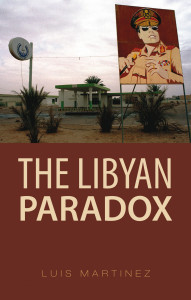|
Reviewed by Major Steven Brothers, U.S. Army Foreign Area Officer, Middle East Regional Affairs Specialist On the eve of her historic visit to Tripoli last September, Condoleezza Rice praised Libyan leader Muammar Gaddafi’s move to renounce his regime’s support of terrorism and dismantle their weapons of mass destruction (WMD) program—a move that led to the end of two decades of U.S. sanctions against his country. “It demonstrates that when countries are prepared to make strategic changes in direction, the United States is prepared to respond,” Rice—the first United States Secretary of State to visit Libya in over fifty years—told the BBC at the time. But what, exactly, was Libya’s motivation to do this and has it truly reformed itself? How did the sanctions affect the regime’s hold on the country? What impact did the events of September 11, 2001, the ensuing US-led “War on Terror” and the US invasion of Iraq all have on Gaddafi and his regime? Louis Martinez, a Research Fellow at the Center for International Studies and Research, addresses these questions and more in his latest book The Libyan Paradox. Conventional wisdom argues that the effects of the sanctions—which included skyrocketing inflation, political unrest and an Islamic insurgency—forced the Gaddafi regime to “convert” from a “rogue terrorist state” to a partner in the “War on Terror.” Martinez addresses this in his introduction and states that his purpose is to show the reader how the “evolution” of the regime (notice he does not use the word “reformation”) occurred as a result of the sanctions and a necessity to face resulting, unforeseen threats. He also wants to show the reader how—though it may appear that real reforms have taken place—the Libyan regime may not have changed much at all. Overall, Martinez succeeds in his goal by explaining that Libya’s “conversion” was necessary after the sanctions led to the government’s inability to provide for its population, which in turn damaged the regime’s credibility. This led to a severe increase in public dissatisfaction with the regime, which itself gave rise to a powerful Islamic insurgency. The regime became especially concerned after the US invasion of Iraq and seeing how quickly Saddam Hussein’s government was toppled. Ultimately, Gaddafi realized that he had no choice but to change Libya’s economic, political, and security aims so that they became in line with those of the West. Many in the foreign affairs and counter-terrorism communities pointed to this as a “textbook case” in how a regime that had been previously labeled a terrorist state could be altered to become “one of the good guys” and adopt a free market economy and democracy. However, those who subscribe to this school of thought might reevaluate their conclusions after reading The Libyan Paradox. Gaddafi’s reforms, in reality, would be a disappointment to those who champion Libya as proof positive that “rogue states” can be reformed and “convert” to democracy. One gathers that corruption and coercion are still mainstays of the economic system; that there is a tremendous lack of transparency in business; that political persecution is still rampant; and that the government oppressively silences any opposition. In fact, Libya has done the bare minimum to reestablish diplomatic ties and court foreign investment. Martinez describes Libya’s newly “reformed” status as that of a “liberal authoritarian state.” To explain all of this in greater detail, he devotes a chapter to the sources of Gaddafi’s power and how he cleverly maintains his authority. As interesting as this section was to read, the last chapters were more so as it is there where he discusses what reforms are still necessary, along with what the future might hold for the state of Libyan politics after Gaddafi’s son succeeds him. The book is, at times, slightly difficult to follow. This may be the result of it being a translation as it was originally written in French. In a couple of particularly confusing cases, Martinez uses incorrect words or tenses giving the appearance that he is contradicting himself. For example, Martinez discusses how Gaddafi’s daughter attracts negative attention for her liberal, Western style of dress and at the same time she is apparently becoming more conservative by having “…taken up the veil…”—two obviously conflicting ideas. Also, while the book contributes well to the intermediate-level study of contemporary Libyan affairs, the reader would benefit from a lengthier discussion of Libya’s relations with Europe (both pre and post-sanctions) and more details on Gaddafi’s persona, as well as that of his son, would be helpful in understanding the direction the regime may be heading. Martinez’s book, overall, is interesting, timely, and informative to those who have already studied Libya to a degree. If one wishes to further their knowledge of the subject, particularly the inner workings of the regime, then The Libyan Paradox is a good way to do just that. |


 The Libyan Paradox
The Libyan Paradox